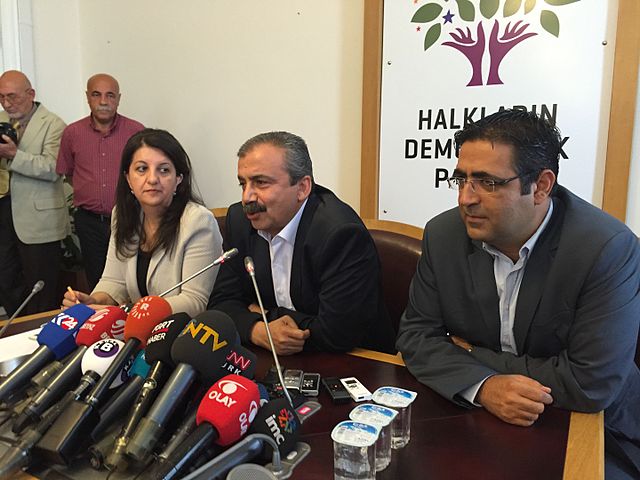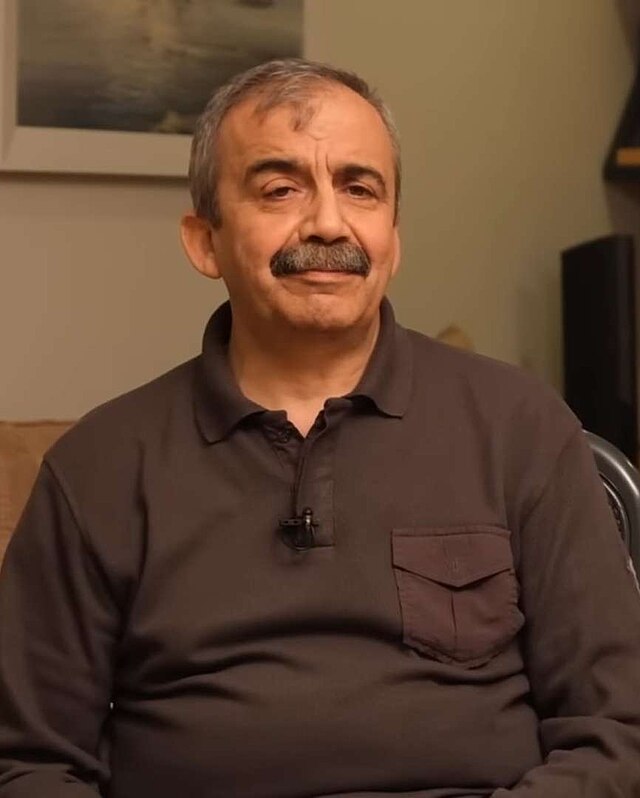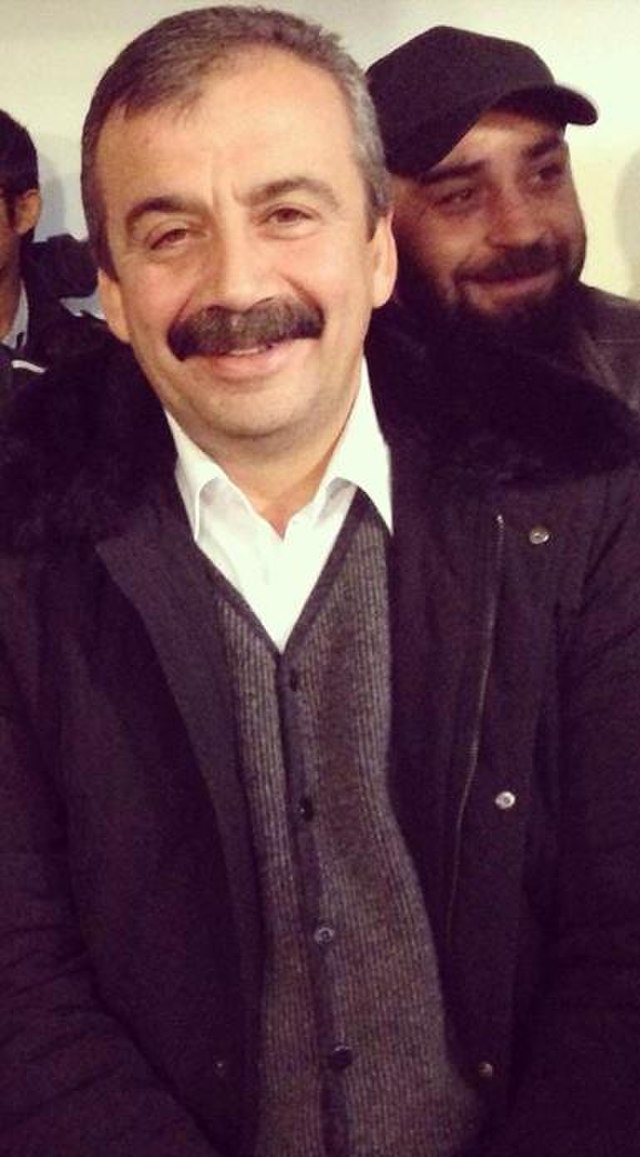Written by Azad Berwarî (Dengê Çiyayên)
On April 15th this year, politician Sırrı Süreyya Önder suffered a heart attack and was in intensive care for several weeks afterwards. His condition was deteriorating, with doctors reporting signs of neurological decline and a potential risk of circulation issues. Political figures from both pro-Kurdish and Turkish sides showed concern and respect for him during this time. Ocalan voiced sadness over his illness, and said he was a person who “shattered prejudices in society, in Parliament, and on the streets.” Turkish President Erdogan called the pro-Kurdish DEM Party to receive updates on Önder’s condition. Leaders from Turkey’s other influential parties also shared concern about his status, showcasing the breadth of concern across Turkey’s political landscape for Önder’s health, regardless of political background.
Everyone’s fears would soon come to pass. On May 3, 2025, Önder passed away from his ailments. The people of various backgrounds also mourned his passing and gave their condolences. Istanbul Mayor Ekrem İmamoğlu, currently in prison due to orders from the Turkish government, extended his condolences to his family through social media. Republican People’s Party (CHP) İnan Akgün Alp proposed that this year should become “Sırrı Süreyya Önder Peace Year” to commemorate Önder’s life and work. The Kurdistan Communities Union (KCK) also honored him as a martyr for democratic and peaceful struggle.
The widespread concern for Önder’s condition during his hospitalization and the condolences from all sides after his death highlight his significant role in the political scene in Turkey, especially with the ongoing peace negotiations between Ocalan and Turkey regarding PKK disarmament and Kurdish rights in Turkey. A Turkish member of the pro-Kurdish Peoples’ Equality and Democracy (DEM) Party, both Kurds and Turks saw him as a gateway to peace for both sides. The grief surrounding his death is a sign of his legacy of diplomacy and cooperation for both ethnicities to come to a lasting peace that would ensure true democracy in Turkey. His life and political activities gave hope that freedom and equality, and their continuation, were within everyone’s grasp at this time.

Politics always surrounded Sırrı Süreyya Önder, even at a young age. Born on July 7, 1962, his father was one of the founders of the Workers’ Party of Turkey (TIP), Ziya Önder. Even when he was 16, the government arrested him for protesting the Maraş Massacre in 1978, where the Turkish armed group, Grey Wolves, massacred hundreds of leftists and Alevi Kurds in the town to suppress leftist demonstrations there. He’d later inherit his father’s political legacy after graduating from high school and entering the Ankara University Faculty of Political Sciences. He only stopped his education in 1980 when a coup occurred against the government. The government later arrested him with a 12-year sentence. Önder spent much of his time in prison participating in hunger strikes, and the prison system later released him in 1987.
Önder gained the most prominence from his work as a filmmaker. In 2006, he earned more attention with his film Beynelmilel (The International), a satirical take on the 1980 coup. The film won the 2007 Adana International Golden Boll Film Festival’s Best Film Award. Regarding further political activities, Önder also wrote for the Radikal newspaper, paving the way for his later political career in Turkey.
In 2011, he won the election for Istanbul MP with the pro-Kurdish Peace and Democracy Party (BDP). He later served as an MP for the Peoples’ Democratic Party (HDP), meant to succeed the previous BDP.
Önder’s membership in both of these parties and the current DEM Party was a boon to the Kurdish movement within Turkey’s borders. Although these parties continue a pro-Kurdish stance, one of their primary goals is achieving peaceful relations between Kurds and Turks. This goal also reflects the history of attempts at peace between Kurds and Turks in Turkey. Leyla Zana attempted to establish this peace once she won a seat in the Turkish assembly in 1991; she swore her oath in Kurdish, stating, “I take this oath for the brotherhood between the Turkish people and the Kurdish people.” The Turkish state later arrested her in 1994, accusing her of acting against the state, and they gave her a sentence of 15 years. Ocalan also attempted peace negotiations between his group, the PKK, and the Turkish state in the 90s, only for them to come apart with President Turgut Ozal’s death. After Turkey captured Ocalan, he has attempted more than once to establish peace between Kurds and Turks through his ceasefire deals with Turkey, only to backfire due to Turkish incursion.
Sırrı Süreyya Önder’s Turkmen heritage and leftist background made him a good fit as someone who struggled his whole life for the brotherhood of the peoples. As a Turkish national who was empathetic to Kurds, Önder was someone both Kurds and Turks could communicate with. With his leftism garnering empathy with Kurds and his nationality allowing some room for even ultra-nationalist Turks to see him as one of their own, Önder had the qualities of a key negotiator for both sides. With the Kurdish movement’s goals for peace with Turkey, Önder could communicate their goals to another group that was otherwise hostile to Kurds, slowly making the idea of peace between the two ethnicities seem more viable to Turks who otherwise would have shot down the idea of cooperating with the Kurds or giving them any cultural rights or autonomy. Önder had a favorable reputation due to his feet in both worlds.
He put his time in the pro-Kurdish parties to good use. At the Gezi Park protests 2013, he stood in front of a construction machine to stop the government from destroying the park. These protests later became protests against corruption in Turkish politics. Önder’s presence at the protest led other Turks to see him representing their issues as much as the Kurds’. Önder’s image as a representative of Kurds also increased when he was involved in the Imrali Island delegation that occurred in the same year, helping negotiate peace terms for both Kurds and Turks. Later that year’s Newroz celebration, he read Ocalan’s message to the Kurds in Diyarbakir, testifying his ability to represent Kurds and Turks.

That’s not to say his position didn’t come with risks. When the negotiations failed, the government arrested Önder for announcing Ocalan’s message with a sentence of 3 years and 6 months in prison. They later released him in 2019 after the Constitutional Court ruled in his favor against the sentence.
His reputation as a middleman for Kurds and Turks made the events leading to his death difficult for everyone across Turkey’s political spectrum. Önder was involved in moderating peace negotiations for the Imrali delegation this year. With his hospitalization and death, the Kurds and Turks lost a symbol of peace between them. His death marks the ongoing talks between Kurds and Turks. Önder left a legacy of peace with his work in politics, managing to relate to both sides as he strived for peace. His life gave both Kurds and Turks hope for a better future, and both now have a hole in their hearts for a man they looked to with mutual respect. Önder’s daughter, Ceren, spoke words at his funeral that capture the kind of man he was to both ethnicities and his family: “You gave everything to peace- except time for yourself,” and later in regards to her relationship with her father, “You gave me everything, but I never had enough of your friendship.”
Today, we grieve a man who gave himself to the goal of peace between Kurds and Turks. We grieve one who, when many Turks would have nothing to do with Kurds, aligned himself with them, yet didn’t let go of his Turkish identity in the process. We remember his work for equality between both ethnicities and what he gave to contribute to the goal of peace in Turkey. As the peace negotiations between the PKK and Turkey are still ongoing, with uncertainty as to what could occur in the future, Sırrı Süreyya Önder’s life is a reminder of the sacrifices made to achieve that peace. Looking back at his life, we will remember that differences don’t have to lead to division. Önder’s work and legacy exemplify how peace between others is possible, even with those currently in conflict.
While the future is uncertain whether these current peace negotiations will finally achieve negotiations for Kurdish rights and equality between Turks and Kurds, Önder’s life will forever be a candle to show others another way forward that can be in our grasp. His life showed that peace is for all people, regardless of ethnicity, who stand for equality for everyone. It is a candle we should keep lit, no matter how long the road to peace will be.

